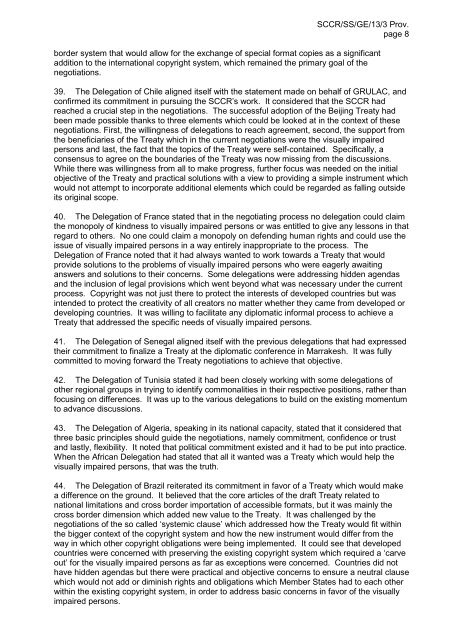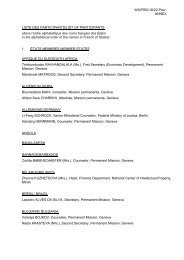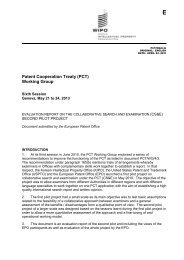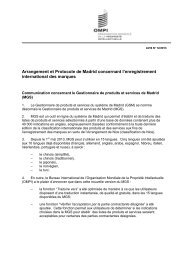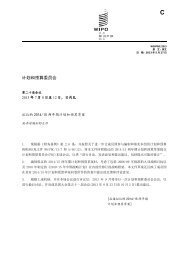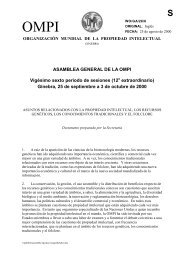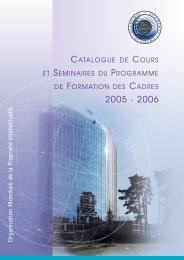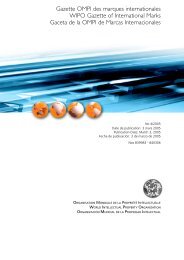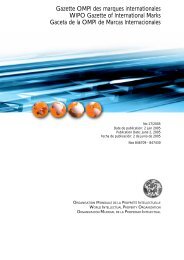Standing Committee on Copyright and Related Rights - WIPO
Standing Committee on Copyright and Related Rights - WIPO
Standing Committee on Copyright and Related Rights - WIPO
- No tags were found...
Create successful ePaper yourself
Turn your PDF publications into a flip-book with our unique Google optimized e-Paper software.
SCCR/SS/GE/13/3 Prov.page 8border system that would allow for the exchange of special format copies as a significantadditi<strong>on</strong> to the internati<strong>on</strong>al copyright system, which remained the primary goal of thenegotiati<strong>on</strong>s.39. The Delegati<strong>on</strong> of Chile aligned itself with the statement made <strong>on</strong> behalf of GRULAC, <strong>and</strong>c<strong>on</strong>firmed its commitment in pursuing the SCCR’s work. It c<strong>on</strong>sidered that the SCCR hadreached a crucial step in the negotiati<strong>on</strong>s. The successful adopti<strong>on</strong> of the Beijing Treaty hadbeen made possible thanks to three elements which could be looked at in the c<strong>on</strong>text of thesenegotiati<strong>on</strong>s. First, the willingness of delegati<strong>on</strong>s to reach agreement, sec<strong>on</strong>d, the support fromthe beneficiaries of the Treaty which in the current negotiati<strong>on</strong>s were the visually impairedpers<strong>on</strong>s <strong>and</strong> last, the fact that the topics of the Treaty were self-c<strong>on</strong>tained. Specifically, ac<strong>on</strong>sensus to agree <strong>on</strong> the boundaries of the Treaty was now missing from the discussi<strong>on</strong>s.While there was willingness from all to make progress, further focus was needed <strong>on</strong> the initialobjective of the Treaty <strong>and</strong> practical soluti<strong>on</strong>s with a view to providing a simple instrument whichwould not attempt to incorporate additi<strong>on</strong>al elements which could be regarded as falling outsideits original scope.40. The Delegati<strong>on</strong> of France stated that in the negotiating process no delegati<strong>on</strong> could claimthe m<strong>on</strong>opoly of kindness to visually impaired pers<strong>on</strong>s or was entitled to give any less<strong>on</strong>s in thatregard to others. No <strong>on</strong>e could claim a m<strong>on</strong>opoly <strong>on</strong> defending human rights <strong>and</strong> could use theissue of visually impaired pers<strong>on</strong>s in a way entirely inappropriate to the process. TheDelegati<strong>on</strong> of France noted that it had always wanted to work towards a Treaty that wouldprovide soluti<strong>on</strong>s to the problems of visually impaired pers<strong>on</strong>s who were eagerly awaitinganswers <strong>and</strong> soluti<strong>on</strong>s to their c<strong>on</strong>cerns. Some delegati<strong>on</strong>s were addressing hidden agendas<strong>and</strong> the inclusi<strong>on</strong> of legal provisi<strong>on</strong>s which went bey<strong>on</strong>d what was necessary under the currentprocess. <strong>Copyright</strong> was not just there to protect the interests of developed countries but wasintended to protect the creativity of all creators no matter whether they came from developed ordeveloping countries. It was willing to facilitate any diplomatic informal process to achieve aTreaty that addressed the specific needs of visually impaired pers<strong>on</strong>s.41. The Delegati<strong>on</strong> of Senegal aligned itself with the previous delegati<strong>on</strong>s that had expressedtheir commitment to finalize a Treaty at the diplomatic c<strong>on</strong>ference in Marrakesh. It was fullycommitted to moving forward the Treaty negotiati<strong>on</strong>s to achieve that objective.42. The Delegati<strong>on</strong> of Tunisia stated it had been closely working with some delegati<strong>on</strong>s ofother regi<strong>on</strong>al groups in trying to identify comm<strong>on</strong>alities in their respective positi<strong>on</strong>s, rather thanfocusing <strong>on</strong> differences. It was up to the various delegati<strong>on</strong>s to build <strong>on</strong> the existing momentumto advance discussi<strong>on</strong>s.43. The Delegati<strong>on</strong> of Algeria, speaking in its nati<strong>on</strong>al capacity, stated that it c<strong>on</strong>sidered thatthree basic principles should guide the negotiati<strong>on</strong>s, namely commitment, c<strong>on</strong>fidence or trust<strong>and</strong> lastly, flexibility. It noted that political commitment existed <strong>and</strong> it had to be put into practice.When the African Delegati<strong>on</strong> had stated that all it wanted was a Treaty which would help thevisually impaired pers<strong>on</strong>s, that was the truth.44. The Delegati<strong>on</strong> of Brazil reiterated its commitment in favor of a Treaty which would makea difference <strong>on</strong> the ground. It believed that the core articles of the draft Treaty related t<strong>on</strong>ati<strong>on</strong>al limitati<strong>on</strong>s <strong>and</strong> cross border importati<strong>on</strong> of accessible formats, but it was mainly thecross border dimensi<strong>on</strong> which added new value to the Treaty. It was challenged by thenegotiati<strong>on</strong>s of the so called ‘systemic clause’ which addressed how the Treaty would fit withinthe bigger c<strong>on</strong>text of the copyright system <strong>and</strong> how the new instrument would differ from theway in which other copyright obligati<strong>on</strong>s were being implemented. It could see that developedcountries were c<strong>on</strong>cerned with preserving the existing copyright system which required a ‘carveout’ for the visually impaired pers<strong>on</strong>s as far as excepti<strong>on</strong>s were c<strong>on</strong>cerned. Countries did nothave hidden agendas but there were practical <strong>and</strong> objective c<strong>on</strong>cerns to ensure a neutral clausewhich would not add or diminish rights <strong>and</strong> obligati<strong>on</strong>s which Member States had to each otherwithin the existing copyright system, in order to address basic c<strong>on</strong>cerns in favor of the visuallyimpaired pers<strong>on</strong>s.


